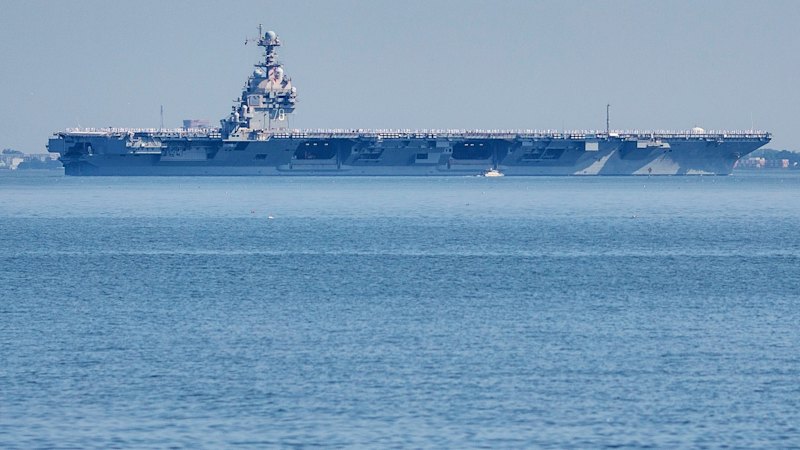
Washington: The United States’ most advanced aircraft carrier, the USS Gerald R. Ford, arrived in the Caribbean Sea on Sunday, signaling a robust display of US military power. This move has sparked questions about the Trump administration’s intentions in South America, particularly as it conducts military strikes against vessels suspected of drug trafficking.
The arrival of the USS Gerald R. Ford, the world’s largest aircraft carrier, along with other warships, was announced by the US Navy. This marks a significant moment in what the administration claims is a counter-drug operation, though it is perceived by some as an escalating pressure tactic against Venezuelan President Nicolás Maduro.
Military Maneuvers and Strategic Implications
On Saturday, President Donald Trump mentioned to reporters aboard Air Force One that he had “sort of made up [his] mind” regarding potential military action in Venezuela. Reports indicate that Trump has been presented with various military options, including the use of special operations forces and direct action within Venezuela.
Since early September, US military strikes have resulted in the deaths of at least 80 individuals across 20 attacks on small boats accused of drug trafficking in the Caribbean and eastern Pacific Ocean. The deployment of the Ford completes the largest buildup of US military power in the region in decades, with Operation Southern Spear now comprising nearly a dozen ships and about 12,000 sailors and marines.
The carrier strike group, featuring squadrons of fighter jets and guided-missile destroyers, transited the Anegada Passage near the British Virgin Islands on Sunday morning, according to the navy.
Statements from Military Leadership
Rear Admiral Paul Lanzilotta, commanding the strike group, emphasized that the deployment would bolster an already significant American naval presence to “protect our nation’s security and prosperity against narco-terrorism in the western hemisphere.” Admiral Alvin Holsey, overseeing operations in the Caribbean and Latin America, stated that American forces are prepared to combat transnational threats destabilizing the region.
Holsey, who is set to retire next month, described the deployment as “a critical step in reinforcing our resolve to protect the security of the Western Hemisphere and the safety of the American Homeland.”
“I think everyone is watching this with sort of bated breath to see just how willing the US is to really use military force,” said Elizabeth Dickinson, International Crisis Group senior analyst.
Regional Reactions and Diplomatic Tensions
In Trinidad and Tobago, which lies just 11 kilometers from Venezuela, government officials have initiated joint training exercises with the US military, scheduled to continue throughout the week. Foreign Affairs Minister Sean Sobers described these exercises as the second occurrence in less than a month, aimed at addressing violent crime on the island, a known transit point for drug shipments to Europe and North America.
The exercises involve Marines from the 22nd Expeditionary Unit stationed aboard navy ships off Venezuela’s coast for months. Venezuela’s government has labeled these exercises as acts of aggression and has not commented on the aircraft carrier’s arrival.
While the administration maintains that the military buildup targets drug trafficking into the US, it has yet to provide evidence supporting claims that those targeted were “narco-terrorists.” Trump has indicated that military actions could extend beyond maritime strikes, suggesting efforts to curb drug trafficking by land.
US Strategy and International Concerns
The US has historically utilized aircraft carriers to exert pressure and deter aggression from other nations, given their capability to launch deep strikes. Some experts argue that while the Ford may not be ideal for combating cartels, it serves as a powerful tool of intimidation against Maduro, potentially pressuring him to relinquish power.
US Secretary of State Marco Rubio has stated that the US does not recognize Maduro, accused of electoral fraud, as Venezuela’s legitimate leader, labeling the government a “trans-shipment organization” complicit in drug trafficking.
Maduro, facing US charges of narco-terrorism, accuses Washington of fabricating a conflict against him. Venezuela has recently showcased a “massive” mobilization of troops and civilians in anticipation of potential American strikes.
Political and Military Ramifications
Trump has defended the strikes on drug boats by asserting that the US is in “armed conflict” with drug cartels, claiming the boats are operated by foreign terror organizations. However, he faces criticism from regional leaders, the UN human rights chief, and US lawmakers, including Republicans, who demand more transparency on the targets and legal justification for the strikes.
Senate Republicans recently voted against legislation that would have restricted Trump’s authority to initiate attacks on Venezuela without congressional approval. Experts remain divided on whether US warplanes might target land positions within Venezuela, though the presence of the 90,000-tonne warship sends a clear message.
“This is the anchor of what it means to have US military power once again in Latin America,” stated Elizabeth Dickinson. “And it has raised a lot of anxieties in Venezuela, but also throughout the region.”
Other experts caution that any US mission to remove Maduro could encounter significant challenges and unintended consequences. Juan Gonzalez, a regional expert and advisor during the Biden era, highlighted potential complexities, noting, “Maduro has said something to the effect of, ‘You want to get rid of me? You think things will get better?’ It is something to consider because Maduro is a moderate … and someone else could usurp power instead of the opposition with the backing of the military.”
As tensions escalate and the international community closely monitors the situation, the potential for broader conflict looms, leaving many to question the future of US-Venezuelan relations.







